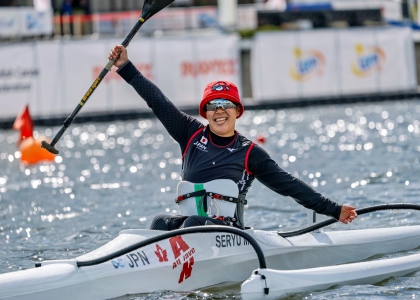The International Paralympic Committee has endorsed the International Canoe Federation’s classification system for the new Paralympic discipline of para-va’a, viewing it as a “work in progress” which can be reviewed over time.
The IPC’s ‘tick of approval’ is a major step towards the establishment of the va’a qualification system for Tokyo 2020, but ICF Paracanoe Chairman, John Edwards, said there is still careful monitoring and engagement work to be done.
“The IPC has been very supportive of the research which we have done so far to finalise the classification system for va’a, and we understand our job is still a work in progress,” Edwards said.
“This is a new discipline for the IPC, so in many ways we are all in unchartered waters. But we are confident we have passed a major milestone and are now well on the way to completing all the necessary requirements.
“The good news is, the IPC’s interim support means we can head to the opening 2018 Paracanoe World Cup event in Szeged this month with a reasonable amount of certainty.
“This is good news for athletes, coaches, National Federations and the ICF.”
The IPC’s Medical and Scientific Director, Peter Van de Vliet, said the committee has no problem with the ICF implementing the current classification system, subject to “the ICF remaining vigilant” on several points.
“The challenge of weighting and aggregation of scores is a complex matter across a range of different sports,” Van de Vliet said.
“It is therefore high on the IPC Classification Committee’s radar to discuss in future meetings.”
The IPC has also urged further monitoring of available data and the development of the va’a discipline, and be open to revisions ‘over time’.
Para Va’a was officially added to the Paralympic program last year, and will make its Games debut in Tokyo in 2020. There will be one women’s event and two men’s events.
The new discipline is competed in a Va'a boat (outrigger canoe), which has an ‘ama’ as a support float on one side. Va'a is the name of the paddling discipline which has its origins in Polynesia.
Para Va’a races were first held at the 2009 World Championships in Canada, but it was not accepted as a discipline at the Rio Paralympics because it was deemed not enough research had been done into the sport.
In the revised classification system, athletes will mainly be allocated a class based on their trunk function assessed during the dynamic tasks of the trunk test; no dynamic trunk function, partial dynamic trunk function and good dynamic trunk function.
The athletes allocated in the lowest functioning class, VL1, should therefore have no dynamic trunk function which is defined as not being able to sit upright on a bench with the legs hanging whilst the thighs and/or pelvis are secured and not moving the trunk in flexion, extension, rotation and lateral flexion.
These athletes should also not have any leg function.
The athletes with the highest function will be allocated the VL3 class and will include the athletes with full dynamic trunk function or almost full dynamic trunk function.




